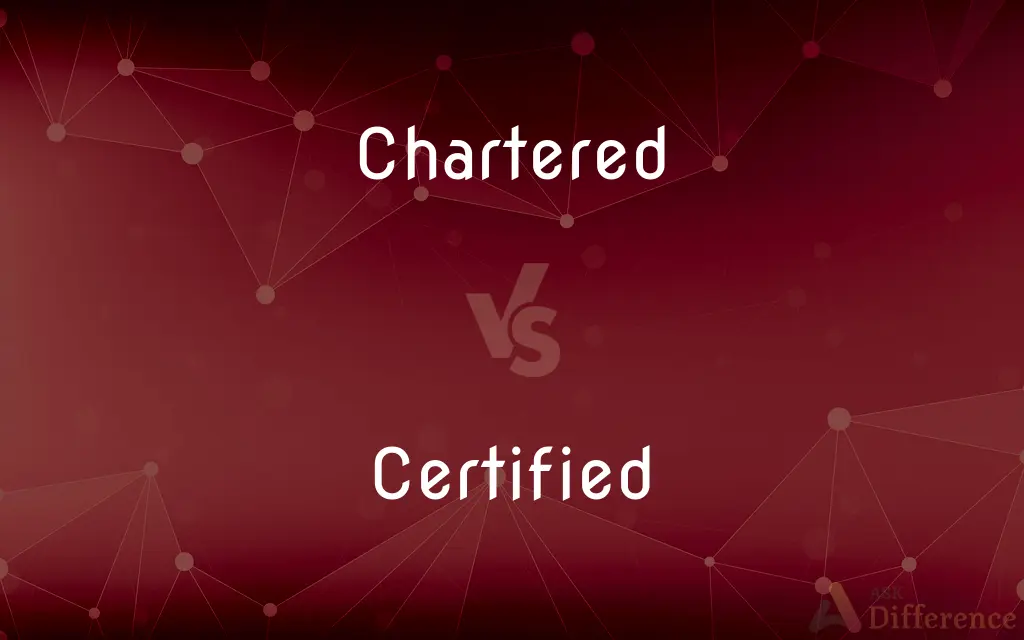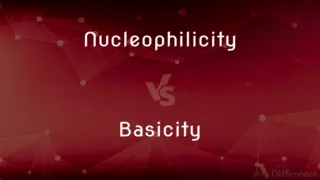Chartered vs. Certified — What's the Difference?
By Maham Liaqat & Fiza Rafique — Updated on March 13, 2024
Chartered professionals typically undergo a specific pathway of education and training in their field, recognized by a royal charter or similar, while certified professionals have passed an examination or met criteria set by a certifying body.

Difference Between Chartered and Certified
Table of Contents
ADVERTISEMENT
Key Differences
Chartered status is often awarded by professional bodies that have received a royal charter or similar endorsement, indicating a high level of expertise and commitment to ethical standards within a specific profession. This status usually requires a combination of advanced education, lengthy experience, and passing rigorous examinations. Whereas, certified professionals have met specific requirements set by a certifying authority, which could include passing exams, completing educational courses, and accumulating a certain amount of practical experience. These certifications are widely recognized across various industries and are essential for professionals looking to validate their skills and knowledge.
Being chartered often signifies a broader recognition within a profession, reflecting a commitment not only to personal excellence but also to the advancement of the field itself. This includes adherence to ethical standards and ongoing professional development. On the other hand, certification focuses more on the individual’s competency in specific skill sets or knowledge areas at a given point in time. Certification might need to be renewed periodically through continued education or re-examination.
In many fields, holding chartered status is seen as a pinnacle of professional achievement and may open doors to higher-level positions, leadership roles, and greater responsibilities. It symbolizes a lifelong commitment to learning and excellence. Conversely, being certified is often a prerequisite or stepping stone within a career, essential for certain positions or specializations and indicating proficiency in a particular domain.
Some professions require individuals to be both chartered and certified, using the chartered status to emphasize their professional ethos and the certification to highlight their expertise in specific areas. While chartered status is usually specific to certain countries or regions, certifications can be more universally recognized, allowing professionals to demonstrate their qualifications across borders.
The pathways to becoming chartered or certified can differ significantly, reflecting the values and requirements of the respective professional communities. Chartered pathways usually involve a more holistic approach, including mentorship, ethics, and leadership training, whereas certification paths may be more focused on technical skills and knowledge assessments.
ADVERTISEMENT
Comparison Chart
Recognition
Granted by institutions with royal charters or similar endorsements.
Offered by professional certifying bodies.
Requirements
Advanced education, experience, and passing rigorous exams.
Passing exams, completing courses, and practical experience.
Significance
Indicates a high level of expertise and commitment to ethical standards.
Validates specific skills and knowledge.
Renewal
May require ongoing professional development but not always re-examination.
Often requires periodic renewal through education or re-examination.
Geographic Scope
Usually specific to certain countries or regions.
More universally recognized across borders.
Compare with Definitions
Chartered
Chartered professionals are recognized for their advanced level of knowledge and skills within their profession.
As a chartered financial analyst, she possesses an advanced understanding of investment management and financial analysis.
Certified
Most certifications need to be renewed through continuing education or re-examination to ensure ongoing competency.
To maintain his certified network engineer status, he must complete 30 hours of continuing education every three years.
Chartered
Reflects a commitment to the highest standards of ethics, professionalism, and continuous learning within a field.
His chartered engineer title signifies his dedication to upholding the engineering profession's integrity and competence.
Certified
Certifications are recognized across various industries, often globally, as evidence of professional competency.
As a certified public accountant, her credentials are recognized and respected worldwide.
Chartered
Encourages ongoing learning and development to maintain the chartered status throughout a professional's career.
He attends annual conferences and workshops to fulfill his professional development requirements as a chartered surveyor.
Certified
Holding a certification can be crucial for job placement, career advancement, and specialization in many fields.
Obtaining a certified information systems security professional certification is a significant milestone for anyone pursuing a career in cybersecurity.
Chartered
A designation given to professionals who have met the rigorous standards of education, experience, and competency in a specific field, often associated with a royal charter.
After years of study and professional development, she achieved chartered status in her accounting profession.
Certified
Confirms an individual's capability and expertise in particular skill sets or knowledge areas.
She earned her certification in digital marketing, validating her expertise in the field.
Chartered
Involves a combination of advanced education, lengthy professional experience, and success in challenging examinations.
To become a chartered psychologist, one must successfully navigate through extensive training and rigorous assessments.
Certified
A credential awarded to individuals who have demonstrated their knowledge and proficiency in a specific area by passing a standardized exam or meeting set criteria.
After passing the certification exam, he became a certified project manager.
Chartered
(of an accountant, engineer, librarian, etc.) qualified as a member of a professional body that has a royal charter.
Certified
To confirm formally as true, accurate, or genuine
The police certified that a suspect had been arrested.
Chartered
(of an aircraft or ship) having been hired
80 journalists were flown in by chartered plane
Certified
To guarantee as meeting a standard
Butter that was certified Grade A.
Chartered
A document issued by a sovereign, legislature, or other authority, creating a public or private corporation, such as a city, college, or bank, and defining its privileges and purposes.
Certified
To acknowledge in writing on the face of (a check) that the signature of the maker is genuine and that there are sufficient funds on deposit for its payment.
Chartered
A written grant from the sovereign power of a country conferring certain rights and privileges on a person, a corporation, or the people
A royal charter exempted the Massachusetts colony from direct interference by the Crown.
Certified
To issue a license or certificate to.
Chartered
A document outlining the principles, functions, and organization of a corporate body; a constitution
The city charter.
Certified
To declare to be in need of psychiatric treatment or confinement.
Chartered
An authorization from a central organization to establish a local branch or chapter.
Certified
(Archaic) To inform positively; assure.
Chartered
Special privilege or immunity.
Certified
To vouch for the authenticity of something
Certify to the facts.
Chartered
A contract for the commercial leasing of a vessel or space on a vessel.
Certified
Simple past tense and past participle of certify
Chartered
The hiring or leasing of an aircraft, vessel, or other vehicle, especially for the exclusive, temporary use of a group of travelers.
Certified
Endorsed authoritatively as having met certain requirements; guranteed; as, certified milk; certified mail; a certified check. Opposite of uncertified.
Chartered
A written instrument given as evidence of agreement, transfer, or contract; a deed.
Certified
Legally insane according to clinical criteria.
Chartered
Of, relating to, or being an arrangement in which transportation is leased by a group of travelers for their exclusive, temporary use.
Certified
Holding appropriate documentation and officially on record as qualified to perform a specified function or practice a specified skill.
Chartered
To grant a charter to; establish by charter.
Certified
Endorsed authoritatively as having met certain requirements;
A certified public accountant
Chartered
To hire or lease by charter
Charter an oil tanker.
Certified
Having quality or payment or delivery guaranteed;
Certified milk
Certified check
Certified mail
Chartered
To hire (a bus or airplane, for example) for the exclusive, temporary use of a group of travelers.
Certified
Fit to be certified as insane (and treated accordingly)
Chartered
Having a charter.
Certified
Holding appropriate documentation and officially on record as qualified to perform a specified function or practice a specified skill;
A registered pharmacist
A registered hospital
Chartered
(specifically) Having membership of the relevant professional body and the necessary qualifications to carry on a particular profession.
A chartered surveyor, a chartered accountant
Chartered
Simple past tense and past participle of charter
Chartered
Granted or established by charter; having, or existing under, a charter; having a privilege by charter.
The sufficiency of chartered rights.
The air, a chartered libertine.
Chartered
Hired or let by charter, as a ship.
Chartered
Hired for the exclusive temporary use of a group of travelers;
A chartered plane
The chartered buses arrived on time
Common Curiosities
Can a professional be both chartered and certified?
Yes, professionals in some fields may be both chartered and certified, highlighting both their broad professional commitment and specific skill sets.
What is the main difference between chartered and certified?
Chartered professionals have met specific standards set by a body with a royal charter or similar, involving education, experience, and exams, while certified professionals have passed exams or met criteria by a certifying body.
Can certifications help in career advancement?
Yes, certifications are often crucial for job placement, career advancement, and specialization in many fields.
Do both chartered and certified professionals require ongoing education?
Yes, both typically require ongoing professional development to maintain their status, though the specifics can vary.
Which is more recognized internationally, chartered or certified status?
Certified status is often more universally recognized, especially when certifications are from globally recognized bodies.
Is chartered status or certification more prestigious?
Prestige can vary by field, but generally, chartered status is seen as a pinnacle of professional achievement, while certification validates specific skills.
Are there exams involved in becoming chartered or certified?
Yes, both paths typically involve passing rigorous exams, though the nature and focus of these exams can differ.
Is it harder to become chartered or certified?
The difficulty can vary by field and individual circumstances, but becoming chartered is generally seen as more rigorous, requiring a broader range of qualifications.
How long does it take to become chartered or certified?
The time can vary widely depending on the profession, level of existing education, and the specific requirements of the chartered or certified program.
Can chartered or certified status expire?
Certified status often requires periodic renewal, while chartered status may have less frequent or different requirements for maintaining the designation.
Is chartered status recognized in all industries?
Chartered status is more common in certain professions, such as accounting, engineering, and surveying, and its recognition can vary by industry.
What are the benefits of being certified?
Benefits include validation of specific skills, international recognition, essential for certain positions, and evidence of professional competency.
What are the benefits of being chartered?
Benefits include recognition of expertise, commitment to ethics, professional development opportunities, and potential for higher-level positions.
Do I need work experience to become chartered or certified?
Yes, both paths typically require some form of professional experience, though the amount and type can vary significantly.
Why would someone choose to become chartered instead of certified?
Individuals might choose chartered status to demonstrate a higher level of professional achievement, commitment to ethical standards, and dedication to their field's advancement.
Share Your Discovery

Previous Comparison
Nucleophilicity vs. Basicity
Next Comparison
Capellini vs. SpaghettiniAuthor Spotlight
Written by
Maham LiaqatCo-written by
Fiza RafiqueFiza Rafique is a skilled content writer at AskDifference.com, where she meticulously refines and enhances written pieces. Drawing from her vast editorial expertise, Fiza ensures clarity, accuracy, and precision in every article. Passionate about language, she continually seeks to elevate the quality of content for readers worldwide.














































